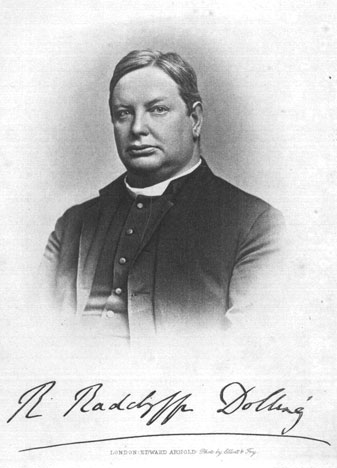 |
VICAR OF SEGHILL, NORTHUMBERLAND EDWARD ARNOLD 1903 |
 |
VICAR OF SEGHILL, NORTHUMBERLAND EDWARD ARNOLD 1903 |
Chapter I.
Chapter II.
Chapter III.
Chapter IV.
Chapter V.
Chapter VI.
Chapter VII.
Chapter VIII.
Chapter IX.
Chapter X.
Chapter XI.
Chapter XII.
Chapter XIII.
Chapter XIV.
Chapter XV.
Chapter XVI.
Chapter XVII.
Chapter XVIII.
Chapter XIX.
Chapter XX.
Chapter XXI.
Chapter XXII.
Chapter XXIII.
Chapter XXIV.
PREFACE WHEN I was asked by his relatives to compile the memoir of my dear friend Robert Radclyffe Dolling, I hesitated at first to promise to do so, from a fear lest the pressure of various duties in a large parish should render the fulfilment of the promise impossible, or very long delayed. However, on consideration, I felt that it would be wrong to allow anything to hinder the attempt to insure a permanent memorial of one whose life and influence, although already the cherished possession of many, yet ought to be still more widely known throughout the nation and the Church.
Any author's profits accruing from the sale of this book will be devoted to the purposes of the Dolling Memorial Fund, of which some account will be found in Appendix II.
A friendship with Robert Dolling on my part, extending for over twenty years before his death, and the fact that for seven years of that time I was in daily and most intimate contact with him, as one of his assistant clergy at S. Agatha's, Landport, have enabled me to write with a first-hand knowledge of many of the events recorded in the following pages, and of much of the inner mind of Father Dolling himself, and of his sentiments and line of action on various important subjects. I have tried to present to the reader a picture of him as he actually was. I have also aimed not only at truthfulness of general impression, but also at accuracy of detail, as far as possible, without burying the main interests of the story under a mass of minutiae, or losing its central thread in the needless following of side-issues.
I have to thank Father Dolling's relatives for allowing me to see a good deal of matter of a more or less personal nature, and yet essential for fitting together the various portions of a life which, though comparatively short, was crowded with events and touched a multitude of interests. I have also to thank a very large number of people for recollections, etc., sent to me of him who had helped them, spiritually or temporally, in so many ways, and had so deeply and worthily gained the trust and affection of their souls. Owing, however, to the fact that this book had to be limited in size, it has been found absolutely impossible to use, even in the briefest way, a great deal of this material; nor is it possible to name all who have so kindly helped, the number of them is so great. But I thank them, all the same, one and all.
I have to return special thanks to my friend Mr. F. A. Thorold Eller for a great deal of time and trouble given to the work of arranging correspondence, MS. material, etc., for this life. Of Father Dolling's own correspondence I have been able to secure but a very little. His letters were, as a rule, of the shortest description.
I will not unduly lengthen this preface by any consideration of Father Dolling's position as a religious teacher, or as a leader in questions of moral and social reform. Such matters will present themselves with sufficient significance in the course of the narrative. I would only say here, let no one read this book as if it were merely the record of a set of opinions, religious, social, or political. Robert Dolling had opinions, or rather convictions, on such subjects, and very strong ones. But the greatest thing about him was his intensely vital personality, and the strength of its influence for righteousness.
To be near him was to feel alive, to be again buoyant, joyous, young in heart. Dulness, conventionality, hardness of mind and of feeling could not exist within the range of his potent influence. He was a unique force, with power 'to free, arouse, dilate' the minds and sympathies of those who came in contact with him.
No doubt this book may come into the hands of some who are not in complete sympathy with all or with much which Father Dolling so vigorously advocated at one time or another. Let them not, therefore, think that the story contained within it has no message for them. No honest man or woman can consider what Robert Dolling was and did without feeling braced and strengthened, cleansed, and exhilarated; it is 'as a breeze from places strong for life.'
CHARLES E. OSBORNE. SEGHILL,
April, 1903.
Project Canterbury